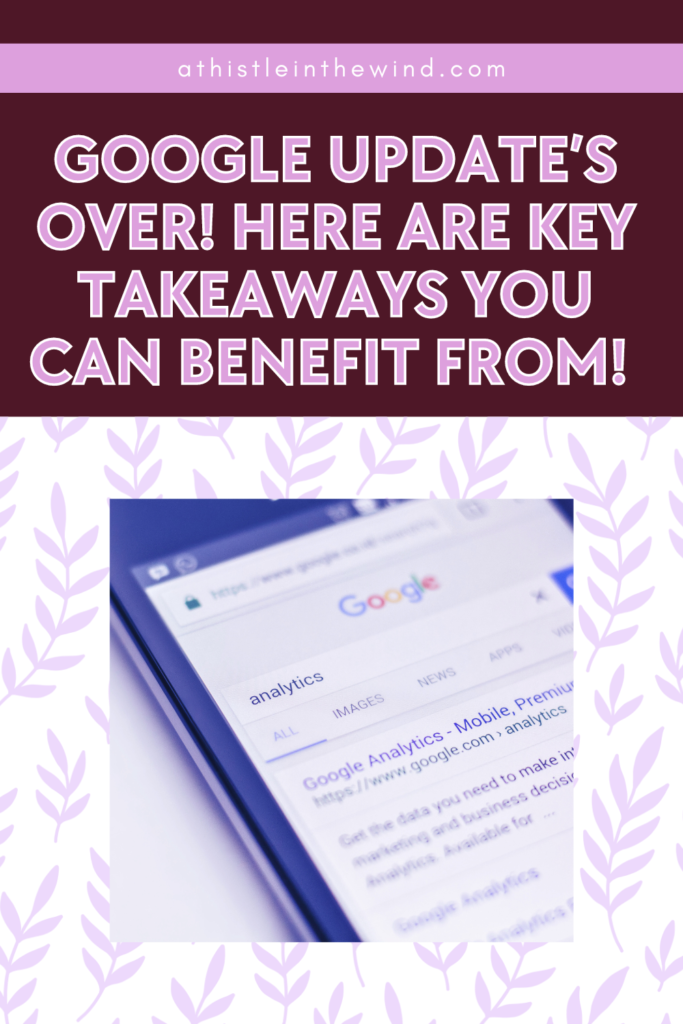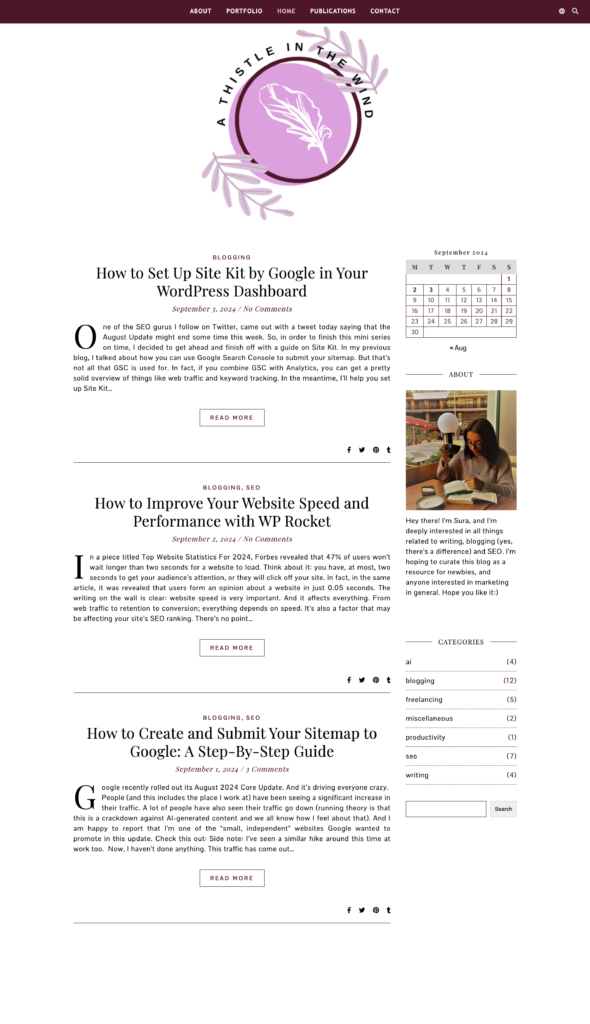Google Update’s Over: Now What? Key Takeaways You Can Benefit From Today!

The Google Update’s over! I actually cut it pretty close with the last blog. The update finished a few hours after I published my blog on Site Kit. I think this is the first time in the history of this blog that I’ve actually done something on time, and I’m super pleased with myself. Let’s take a moment to appreciate that for a second.
I thought that since I’ve been weirdly obsessed with it (I’m usually very obsessed with Google updates; I just never talk about it here), I’d go into a bit more into detail about what happened, and the key takeaways that you can use to further improve your website.
This one’s probably going to be a short one, but I hope you find it valuable!
The Impact (So Far)
learning that Google does updates once every few months. But the reason I’ve been super fixated with this recent update, is because Google really dropped the ball in the September 2023 update.
Seriously, a lot of websites saw their traffic plummet overnight. And they haven’t recovered since then. Google attempted to “fix” some of the issues in an update in March of this year, but few saw any improvements. Actually, even more sites saw a drop in traffic after that update too. I hope you can see where I’m going with this.
Everyone was kind of interested in seeing what this particular update could do. And we have seen some impact. In a recent Twitter poll, it was seen that:
- 44% sites reported that their traffic is down
- 27% reported that traffic was up
- 29% reported no change at all
To be very honest, I hadn’t expected that this would be the case. At work, and in the professional circles I run in, everyone actually noted that our sites were performing better.
In fact, in my blog on creating a sitemap, I also noted that my traffic was up, and it’s continued to be on the rise since. But to see that many people hadn’t had the same experience as me and my peers was interesting and made me wonder: what can you do about this?
Key Takeaways from the August 2024 Core Update
According to John Mueller, Search Advocate at Google, here’s what you need to know about the August Update:
This update is designed to continue our work to improve the quality of our search results by showing more content that people find genuinely useful and less content that feels like it was made just to perform well on Search.
You can read the full statement here. There’s something super important noted within this statement, that everyone has picked up, and it’s this:
As always, we aim to connect people with a range of high quality sites, including small or independent sites that are creating useful, original content, when relevant to users’ searches.
So, basically, the way things are looking, Google’s more interested in promoting content that is genuinely more useful. So, if you’re a blogger with a particular niche, now’s a good time to go all-in. I’ll admit that seeing this kind of worried me because I talk about a bunch of stuff. But moving on, given how my best performing posts are always either related to SEO or blogging, I’ll probably focus more on that. Of course, you could argue that freelancing is a part of building a business online, and SEO comes under writing, which can come under blogging. And everything we’ve ever talked about on this blog generally comes under the umbrella of digital marketing.
But Google’s looking for niche blogs that create genuinely useful content. So, maybe it’s time to focus on that?
What Does This Mean?

It’s been a week since the update ended, and you’ve probably had time to see how it has affected you. If you’re one of the people who’ve seen improvements, that’s great. But if you’re part of the vast majority of people who’ve seen little to no improvements, and worse yet you’ve seen your traffic go down, now’s a good time to re-evaluate your content.
There’s a chance that your site was missing that “oomphf” Google’s looking for. This can be due to a number of reasons:
- Your SEO needs to be looked at more closely
- There might be critical site architecture issues
- Your content might have been perceived as low-quality or AI-generated spam
- Your link neighbourhood might have indicated that you’re a low-quality publisher
I know, there are plenty of “might haves” here, but these are generally the issues behind losing traffic after an update. And even if you didn’t, there’s no harm in still improving. Google releases updates every few months, so even if you lost during this update, you can still improve.
How Can You Benefit From the Algorithmic Changes Google Has Made?
Scrolling through Twitter and Reddit, I’ve been able to identify some patterns emerging among the winners of this update. Granted, there weren’t many, but as I’ve mentioned, I’m seeing a positive trajectory at work and here too. And this is what I’ve found so far:
1. Experience and Authenticity Won This Time Around
Well, technically, experience and authenticity wins all the time, but let’s be honest: there are plenty of sites that rehash content. I’ve developed my own voice for this blog because I know the niche I’m in is super popular. Seriously. Just go to Pinterest and type “blogging.”
You’ll find millions of pins, all linking to different blogs on the subject. The thing that’s bothered me about this niche has always been how saturated it is, and the content appears repetitive. Granted I’ve had to write some of these extremely common blogs too, but that’s because you can’t not talk about them.
So, what do you do? Well, in my case, I’ve been thinking about being more specific. Like, I really enjoyed my AI series, and they also perform really well. But do I want to talk about AI all the time? I don’t think so.
So, I’ve been thinking about either focusing purely on the content marketing side of things, or just talking about writing, because I do enjoy that. I’ve been thinking about writing on some of the things I’ve picked up along the way while working on my manuscript. That would be nice. I’m still fuzzy about the details but I do think it might be better for me to focus purely on the art of writing itself.
I think I might write a blog on this. I don’t know for sure yet.
2. User Experience is Super Important
I cannot emphasise on this enough. I feel like I’ve been talking about this for a while. Not sure if this was here but I do tend to focus on user experience at work a lot. I feel like there’s a blog due on this subject too.
Anyway, what you need to focus on is the look and feel of your website. You need to make sure your site’s fast, so people aren’t just waiting for your site to load (chances are, they’ll leave before your site even loads), and that your design isn’t intrusive.
You know what I hate the most when visiting a blog? Seeing ten different pop-ups and ads. Like, I don’t care. I’m not fully invested in your content yet to be subscribing to your email list. That’s actually one of the reasons why I haven’t started an email list yet.
And ads, don’t get me started on those. I hate ads that take up a third of a web page. And Google does too. Poor UX is considered bad practice across the industry. And you also need to make sure that the overall structure of your website makes sense. My blog is pretty simple. Like, I have the option of having sliders, but I decided against it.
Why? Because this is a blog, and there’s no point in adding anything apart from snippets of posts I’ve created. As a result, I’ve kept my site simple:

3. Diversify Your Traffic Sources
In my experience, your site should have some traffic coming in “organically” i.e through search engines like Google, some coming in through organic social media channels, some directly (usually coming in from email marketing or guest posting) and some coming through sources like referrals or affiliates (if you have a particular product/service; why would you do affiliate marketing if you’re just a blog? I don’t know. Has anyone done this? How was it?).
Also, if you’re in the process of link building, you should definitely be careful about your link neighbourhood. Generally, you want to associate with a site that’s got a domain authority that’s either the same or better than yours, or maybe a couple of points below (unless the site’s a super old site on the internet).
Again, this is a great blog topic that I haven’t seen around much. I’m full of great, specific ideas today, aren’t I?
4. Fix Your Site’s Issues
And lastly, you need to fix your site’s issues. I’ve already touched upon this earlier, but it’s critical that you do so. Conduct a site audit, see where you’ve fallen behind and start working on it.
I expect the next Google update to happen towards the end of the year, or early next year, so that gives you enough time to work on your site issues, follow Google’s guidelines and create unique, specific content. If you follow these points I’ve laid out here, I don’t see why you have to lose out on the changes Google makes.


